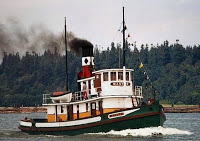Western Maritime Institute Launches Engine Room Rating Program

Program is First of its Kind in Western Canada
Ladysmith, B.C. – November 17, 2017 – In response to the shortage of Marine Engineers in the Canadian and international marine industries, Vancouver Island based Western Maritime Institute has launched the first Transport Canada approved Engine Room Rating program in Western Canada. The 9-week program provides entry-level Marine Engineering training for people who have little to no previous marine experience, but would like to work in the industry initially as Engine Room Assistants.
Combining hands-on and theoretical engineering training, the Engine Room Rating Program introduces students to the knowledge and skills required to assist Marine Engineers with carrying out engine room Watchkeeping duties, handling hand and power tools, and maintaining the vessel’s engines and machinery. Classes will be held in Western Maritime’s new workshop and simulator classrooms in Ladysmith.
The program is made up of the following courses:
- Engine Room Rating
- MED STCW Basic Safety Training
- MED STCW Proficiency in Survival Craft and Rescue Boat
- Marine Basic First Aid

Campus Director, Buki Hough, believes this addition directly responds to the industry’s expressed need for new entrants to address the shortage of trained Marine Engineers. “The marine industry has been expressing the need for more Marine Engineers for a number of years now and it is quite apparent that Canadian marine colleges are not graduating enough candidates to meet industry demands. By investing in new infrastructure to launch this program, Western Maritime Institute is directly contributing to being part of the solution; producing Canadian-trained Marine Engineers with the skills and knowledge to work on all three Canadian coasts, the Great Lakes, and internationally,” she said.
Graduates of the program will be credited three months of qualifying sea service applicable to the Engine Room Rating and Fourth-class Engineer certificates. That means, by successfully completing this program, instead of requiring six months of sea service to sit the Transport Canada Engine Room Rating exam, students will only need three months of sea service, which can be obtained after completing the program.
“We are confident we can build on our long history of providing deck officer training and produce knowledgeable and skilled Engine Room Assistants who are ready to take up roles with BC Ferries, Canadian Coast Guards, Marine Atlantic Ferries, off shore oil and gas companies, and many other employers in Canada,” added Hough.
The first Engine Room Rating program will begin on February 2, 2018 at Western Maritime Institute’s Ladysmith campus and registration is now open. For more information and to register, prospective students can contact Admission Advisor, Emmanuel Adenigbagbe at 250-245-4455. More information is also available on Western Maritime Institute’s website: www.maritimeed.com.
About Western Maritime Institute
Western Maritime Institute is Canada’s largest Transport Canada and Industry Canada-approved private marine training Institute. All instructors have years of industry experience, are individually accredited by Transport Canada for the courses they teach, and hold approved Provincial teaching credentials. The fully-equipped campus includes a fire-fighting and survival craft training simulators, as well as a Transas full bridge simulator. Course offered at the college range from entry level Marine Emergency Duties training and training for new Deckhands and Marine Engineers to Watchkeeping Mate, Master 500GT, and various certifications for Fishing Masters, electronic navigation, and radio operations. On campus residence is available at the Ladysmith campus for out-of-town and out-of-Province students.




I have a degree in electrical and electronic engineering and I want to apply for a program how do I go about it please.
Thank you for your visit and comment to Martin’s Marine Engineering Page, http://www.dieselduck.net.
In regards to your question, there are many hurdles in getting a Marine Engineering Certificate of Competency (CoC), the primary one is your nationality. Usually the nationality (passport) you hold, is also the nation whose CoC you will be issued from, no matter where you go to school. Furthermore, the marine certification authority in that country, will only recognize courses that are approved by them.
All this means that if you want to achieve or upgrade a CoC, you will need to go your marine certification authority’s approved school for the necessary courses. Otherwise, you will waste your time and money.
At the same time, even if you go to a Canadian school to do the courses required, you cannot get a Canadian CoC unless you have resident status, and have completed all the licensing steps in Canada, or at least they need to be approved by Transport Canada Marine Safety and Security, the marine certification authority in Canada.
Probably not what you wanted to hear, but its better hear now than later.